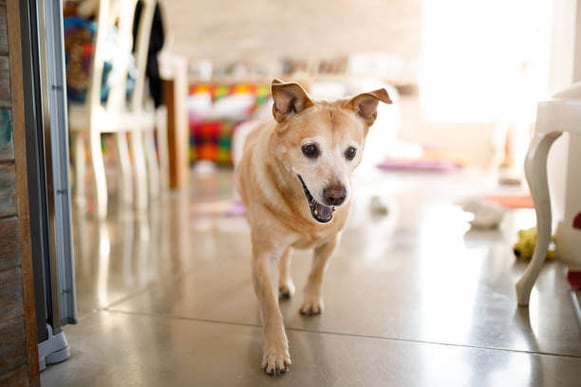Your boarding facility welcomes dogs of every age, including silver-haired seniors.
This presents both a rewarding opportunity and a unique challenge. Older pets often require more attention, tailored care, and a calming environment that differs from what younger dogs may need. Whether it's their health, comfort, or emotional well-being, several factors must be considered when boarding senior dogs to make their stay a positive experience.
Let's review the main items your kennel should examine when caring for senior pups.
Health and Mobility Needs
 Senior dogs often face various health challenges that require close monitoring. Common issues include arthritis, vision or hearing impairments, and chronic conditions such as diabetes or kidney disease. Before the dog's arrival, it is essential to gather detailed information from the pet parent about any health concerns and medication schedules.
Senior dogs often face various health challenges that require close monitoring. Common issues include arthritis, vision or hearing impairments, and chronic conditions such as diabetes or kidney disease. Before the dog's arrival, it is essential to gather detailed information from the pet parent about any health concerns and medication schedules.
Mobility can also be a significant concern for older dogs. These pets may have difficulty navigating stairs or require extra movement time. Consider providing easily accessible accommodations, such as ground-level suites or non-slip flooring, to prevent unnecessary strain on their joints. Offering soft bedding and orthopedically supportive surfaces can also help alleviate discomfort during their stay.
Creating a Safe Environment
To create a safe boarding environment for senior dogs, focus on the following areas:
- Accessibility: Provide ramps or easy entryways for dogs with limited mobility.
- Supervision: Monitor senior dogs more frequently for signs of distress or discomfort.
- Temperature control: To support older dogs with difficulty regulating body heat, keep the environment comfortable.
- Medication management: Have a clear system for tracking and administering medications.
- Emergency protocols: Prepare for health emergencies by having a vet on call and ensuring your staff is trained in handling senior dog emergencies.
Addressing these key areas will create an environment that minimizes risks and promotes the well-being of senior dogs.
Emotional Well-Being and Comfort
Older dogs can be more sensitive to changes in their environment. Separation anxiety and stress are common in senior pets, especially when they are away from their familiar surroundings and routine. Creating a peaceful and quiet area within your facility can help these dogs feel more at ease. If possible, consider offering private rooms or quieter sections away from high-traffic areas to reduce anxiety.

Routine is crucial for senior dogs, so maintaining a consistent schedule for feeding, bathroom breaks, and medication administration can help them feel more secure. Familiarity is comforting, and keeping these routines can significantly affect how they adjust to their temporary home.
Specialized Services and Care
Offering specialized services can set your facility apart when caring for senior dogs. These might include:
- Therapeutic massage: Helps relieve pain from arthritis or other chronic conditions.
- Low-impact exercise: Gentle walks or swimming can keep older dogs active without overexertion.
- Geriatric dog grooming: Use gentle techniques to clean and groom sensitive skin and coat.
- One-on-one attention: Spend time with senior dogs, offering companionship and comfort during their stay.
These specialized services enhance the dogs' comfort and give pet parents peace of mind, knowing their pets are receiving premium care.
Dietary Considerations
As dogs age, their dietary needs often change. Senior dogs may require specialized diets to manage weight, support joint health, or address medical conditions. Work closely with pet parents to understand specific dietary requirements and feeding schedules before the dog’s stay.
 Consider offering additional services such as preparing fresh or custom meals according to the pet parent's instructions. It’s also important to monitor the dog’s eating habits during their stay, as changes in appetite can be a sign of stress or illness that needs to be addressed promptly.
Consider offering additional services such as preparing fresh or custom meals according to the pet parent's instructions. It’s also important to monitor the dog’s eating habits during their stay, as changes in appetite can be a sign of stress or illness that needs to be addressed promptly.
Communication with Pet Parents
Clear communication with pet parents is critical when boarding senior dogs. Here's how to make the process smoother:
- Pre-boarding consultations: Discuss the dog's health, routine, and special needs before their stay.
- Daily updates: Provide pet parents with regular updates on their dog's well-being, including any changes in behavior or appetite.
- Post-boarding feedback: Offer insights into how the dog adjusted during their stay and any observations that could be helpful for future visits.
This level of communication reassures the pet parents and strengthens your relationship with them, making them more likely to return to your facility in the future.
Boarding senior dogs require a thoughtful approach, considering their physical, emotional, and dietary needs. By offering specialized care, creating a safe environment, and maintaining open communication with pet parents, you can turn what could be a stressful experience into a positive one for both the dogs and pet parents.
 Your efforts in providing comfort and security for these older pets will enrich their lives and solidify your reputation as a caring and attentive pet-care provider.
Your efforts in providing comfort and security for these older pets will enrich their lives and solidify your reputation as a caring and attentive pet-care provider.
Give every pet individualized care easily with Gingr's profiling tools. Get a demo today!


